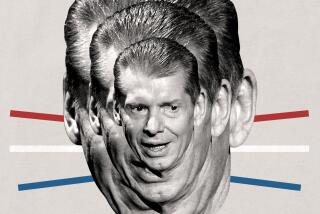A consumer’s guide to the best and worst of sports media and merchandise. Ground rules: If it can be read, played, heard, observed, worn, viewed, dialed or downloaded, it’s in play here.
- Share via
What: “A Savage Business: The Comeback and Comedown of Mike Tyson,” by Richard Hoffer.
Price: $23, Simon & Schuster
Anyone curious to know what lurks in the hearts of men need only read this book. Hoffer, a senior writer at Sports Illustrated, creates an excellent argument that men are composed of greed, power and savagery. Not necessarily news--Thomas Hobbes described our sadly brutish state more than 300 years ago and, it should be noted, pulled fewer punches. For in Hoffer’s often poetic exploration of the two years that followed the heavyweight boxer’s 1995 release from an Indiana prison after a rape conviction, there’s a gnawing subtext of the author being above all this hand-to-hand hooey. While Hoffer reveals Tyson’s heavyweight comeback to be a hoax masterminded by promoter Don King, he forgets one obvious point. We wanted it--from the buffoonery of Peter McNeeley (whose inside story is “A Savage Business” highlight), to the horror of the Holyfield rematch. The fact that he spends pages justifying the attraction of boxing and the knockout punch--even finding a doctor to explain how it’s safer to be KO’d--can only be to assuage his own qualms. The rest of us are just in it for the blood and guts.
If you’re looking for behind-the-scenes information, however, “A Savage Business” delivers, giving commendable reporting of King’s Godzilla-like ability to level whomever he does business with. “A Savage Business” also offers sketches of the various other boxers in the mix, many of them plucked off mean streets, leading Hoffer to describe the Bruce Seldon-Mike Tyson fight in these terms: “There were so many former felons in one place the fight was a virtual parole violation.” Ultimately, this is his greatest misstep--the assumption that as a society, we don’t care about former felons.
Making only passing references to Tyson’s troubled youth was a mistake. All we know from Hoffer’s book is that Tyson is one screwed-up guy in desperate need of a Zanax. Repeatedly, Hoffer asserts Tyson’s suicidal tendencies should be tempered by that $30-million paycheck. Hoffer, however, repeatedly bludgeons King and Tyson for greed.
Here’s the deal: King built a career on not underestimating how many people will pay to see ghetto rage unleashed. Run, when this thing you’ve paid to see proves more potent than your wildest expectations. Soothe your conscience by calling him a beast. Not to his face, of course.
More to Read
Go beyond the scoreboard
Get the latest on L.A.'s teams in the daily Sports Report newsletter.
You may occasionally receive promotional content from the Los Angeles Times.










